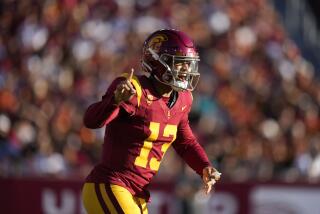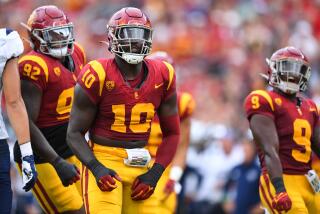Many Happy Returns : Notre Dame: Rocket Ismail, a humble hero, is expected to play against USC despite thigh injury.
- Share via
It doesn’t take a Rocket scientist to figure out how important Raghib Ismail is to the Notre Dame football team. With him, the Irish win. Without him, they don’t.
Of course, Ismail will disagree with the theory. He always does. He calls football a team game, which it is. But few teams depend so much on the wondrous skills of a single player. Even fewer teams expect greatness, something magical and memorable, as the Irish do of Ismail every time he presses the ball against his body and runs.
“He makes the game look easy,” said teammate Todd Lyght, an All-American cornerback. “The best in the country.”
A injury-free Ismail is all things to the Irish--a flanker, a tailback, a wide receiver, a punt returner, a kickoff returner. Mostly, he is indispensable.
Against Penn State last Saturday, the Irish were protecting a 21-7 lead late in the second quarter when Ismail, who had gained 109 all-purpose yards (22 rushing, 76 receiving, 11 returning), suffered a deep thigh bruise just before halftime. He didn’t come back, but Penn State did.
Rid of the dangerous Ismail, Penn State’s defense could concentrate more on stopping the Irish run and less on Notre Dame’s Rocket-free passing attack. And no longer did the Nittany Lions’ coaching staff have to worry about punting or kicking the ball away from Ismail, who runs a 4.28 in the 40-yard dash.
Before Ismail left the game, Notre Dame had accumulated 292 yards on offense. It hadn’t punted. It had converted 12 of 13 third-down plays, to say nothing of building a two-touchdown lead.
After he left, the Irish offense did not cross midfield. They punted five times. No. 1-ranked Notre Dame gained only 75 total yards. Quarterback Rick Mirer completed one of eight passes and threw two interceptions.
It might be a team game, but this is one team that needs Ismail.
The same thing happened against Stanford. Ismail missed the game because of an injury and Notre Dame lost in a stunning upset. It is cause and effect with a twist: Ismail’s absence, combined with a porous Irish secondary, keeps producing unexpected losses.
Still bothered by the thigh bruise, Ismail is expected to play Saturday against USC at the Coliseum, but he probably won’t return kicks, a Notre Dame spokesman said Wednesday.
“We like to get his hands on the ball 20 times (a game),” Notre Dame Coach Lou Holtz said.
And when they don’t, or can’t, the results are obvious. Ismail is the key to the Irish offense.
Of course, Ismail will disagree. He calls football a team game.
Only in the last month or so has Ismail, a junior, begun to acknowledge his impact on the Irish attack. And even when he does, it is reluctantly. A television reporter from Ismail’s hometown, Wilkes-Barre, Pa., asked him recently to talk about the Heisman Trophy race. You would have thought it was the first time Ismail had ever heard of the award.
“In the beginning, I thought people were putting my name in there just to have another name,” he told the WBRE-TV reporter. “I guess I’m starting to realize that maybe my chances are better now.”
Ismail averages almost 14 yards every time he touches the ball. As a rusher, he has gained 498 yards and scored three times in 61 carries. As a receiver, he has caught 30 passes for two touchdowns and 629 yards, which is about 21 yards a reception. He has nine punt returns for 123 yards and 11 kickoff returns for 284 yards and a touchdown. One more kickoff return for a score and Ismail ties the NCAA record of six set by USC’s Anthony Davis.
Of course, Davis was also the guy who scored six touchdowns against Notre Dame in 1972, two of them on kickoff returns. And Davis scored four times against the Irish in USC’s 55-24 comeback victory in 1974. One of those touchdowns was on a 102-yard kickoff return at the start of the second half.
Ismail has come a long way for a guy who, as a freshman, would have been happy just playing special teams.
“That was my goal,” he said. “I never thought it would turn out like this.”
Are you kidding? Jay Hayes, an assistant coach in charge of outside linebackers and special teams, put Ismail on the return teams the moment after he saw him run.
“Like Coach (Holtz) says, he’s the best he’s ever seen,” Hayes said. “That goes for me, too.”
Every Sunday or Monday, the Notre Dame team meets to review game film. These are usually business-like affairs, a time to examine mistakes and think of ways to correct them.
But something happens when the Rocket appears on the screen. The players become quiet as they watch Ismail defy geometry and outrun defenders who seemingly have an angle on him.
As a way of honoring him, Ismail’s teammates make a whooshing sound as they view each dazzling run of his.
Notre Dame linebacker Michael Stonebreaker, a Butkus Award finalist, has done his share of covering running backs on pass routes. But nothing, he said, prepares you for a confrontation with Ismail.
“Usually you’ll play a guy five yards back and one yard in,” Stonebreaker said. “With Rocket (during a pass coverage drill), I was eight yards back and two yards inside. He’ll make three moves and he’s gone. It’s virtually impossible for me to get a hand on him. He can take the long way around me and still get there.”
Given his choice, Ismail prefers playing flanker “because you get to do all of it,” he said. “You run routes. You run the ball. You line up in the backfield. It’s the ideal position as far as I’m concerned.”
That is welcome news to Raider Tim Brown, the Notre Dame alum who won a Heisman the same way Ismail may, with his versatility and eye-catching returns. But Brown is a teensy-weensy worried about the Rocket’s well-being.
“In college, I was 4.35 or 4.38 (in the 40), which is fairly quick, but I still had to utilize my moves more than anything. When I returned a punt or a kickoff, it was more because I got someone off balance more than out-running him. (Ismail) just out-runs people and he does a great job of it. I think he’s a great football player. I just wish he’d stop acting like he was 6-2, 220 pounds, trying to run over people. If he keeps doing that, he’s going to get broken up.”
Ismail understands. He has the injuries to prove it.
“I wouldn’t mind (becoming a tailback), but it wouldn’t be real smart,” Ismail said. “I mean, early in the season I’d probably have a ball. But then it would start to wear on me.”
Already, the attention Ismail receives has worn thin. He almost never answers his phone. Instead, a homemade rap recording serves as a message for the steady stream of callers.
Ismail also has made a habit of dodging reporters. He doesn’t do it out of spite; he does it out of shyness. He would rather not be famous, but famous he is.
Until this year, Ismail would never say no. To interviews. To speaking engagements. To anything that interfered with his pursuit of trying to be a college kid.
Now he does. When people call with their requests--such as the time someone wanted Ismail to draw something for a celebrity auction--he politely declines.
But when a friend calls, he’s there. He missed a Notre Dame practice earlier this year to comfort a classmate who was anguished over the death of a parent. Ismail even drove the classmate to the South Bend airport.
Ask him about his extraordinary speed and he’ll talk about the races he has lost. Ask him about the Heisman and he’ll end up changing the subject. Ask him about declaring himself eligible for the NFL draft and he stops on a dime: he’s returning to Notre Dame for his senior season--end of discussion.
More to Read
Go beyond the scoreboard
Get the latest on L.A.'s teams in the daily Sports Report newsletter.
You may occasionally receive promotional content from the Los Angeles Times.










